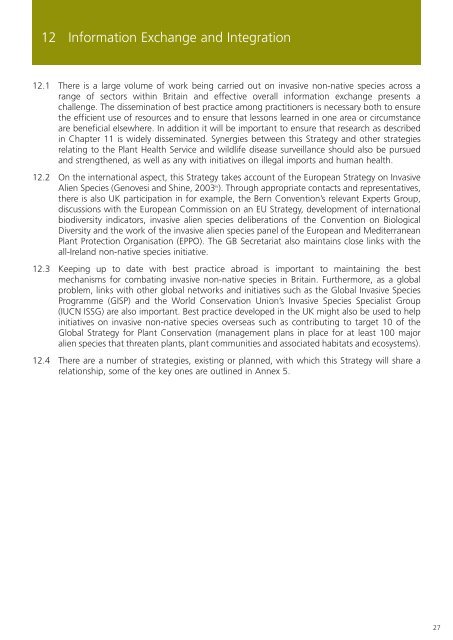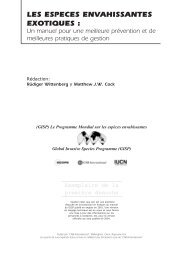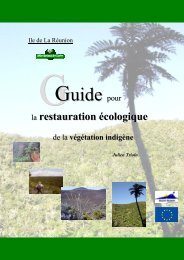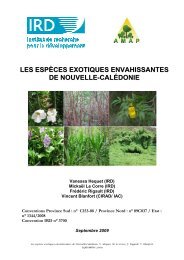The Invasive Non-Native Species Framework Strategy for ... - Defra
The Invasive Non-Native Species Framework Strategy for ... - Defra
The Invasive Non-Native Species Framework Strategy for ... - Defra
You also want an ePaper? Increase the reach of your titles
YUMPU automatically turns print PDFs into web optimized ePapers that Google loves.
12 In<strong>for</strong>mation Exchange and Integration<br />
12.1 <strong>The</strong>re is a large volume of work being carried out on invasive non-native species across a<br />
range of sectors within Britain and effective overall in<strong>for</strong>mation exchange presents a<br />
challenge. <strong>The</strong> dissemination of best practice among practitioners is necessary both to ensure<br />
the efficient use of resources and to ensure that lessons learned in one area or circumstance<br />
are beneficial elsewhere. In addition it will be important to ensure that research as described<br />
in Chapter 11 is widely disseminated. Synergies between this <strong>Strategy</strong> and other strategies<br />
relating to the Plant Health Service and wildlife disease surveillance should also be pursued<br />
and strengthened, as well as any with initiatives on illegal imports and human health.<br />
12.2 On the international aspect, this <strong>Strategy</strong> takes account of the European <strong>Strategy</strong> on <strong>Invasive</strong><br />
Alien <strong>Species</strong> (Genovesi and Shine, 2003 iv ). Through appropriate contacts and representatives,<br />
there is also UK participation in <strong>for</strong> example, the Bern Convention’s relevant Experts Group,<br />
discussions with the European Commission on an EU <strong>Strategy</strong>, development of international<br />
biodiversity indicators, invasive alien species deliberations of the Convention on Biological<br />
Diversity and the work of the invasive alien species panel of the European and Mediterranean<br />
Plant Protection Organisation (EPPO). <strong>The</strong> GB Secretariat also maintains close links with the<br />
all-Ireland non-native species initiative.<br />
12.3 Keeping up to date with best practice abroad is important to maintaining the best<br />
mechanisms <strong>for</strong> combating invasive non-native species in Britain. Furthermore, as a global<br />
problem, links with other global networks and initiatives such as the Global <strong>Invasive</strong> <strong>Species</strong><br />
Programme (GISP) and the World Conservation Union’s <strong>Invasive</strong> <strong>Species</strong> Specialist Group<br />
(IUCN ISSG) are also important. Best practice developed in the UK might also be used to help<br />
initiatives on invasive non-native species overseas such as contributing to target 10 of the<br />
Global <strong>Strategy</strong> <strong>for</strong> Plant Conservation (management plans in place <strong>for</strong> at least 100 major<br />
alien species that threaten plants, plant communities and associated habitats and ecosystems).<br />
12.4 <strong>The</strong>re are a number of strategies, existing or planned, with which this <strong>Strategy</strong> will share a<br />
relationship, some of the key ones are outlined in Annex 5.<br />
27





